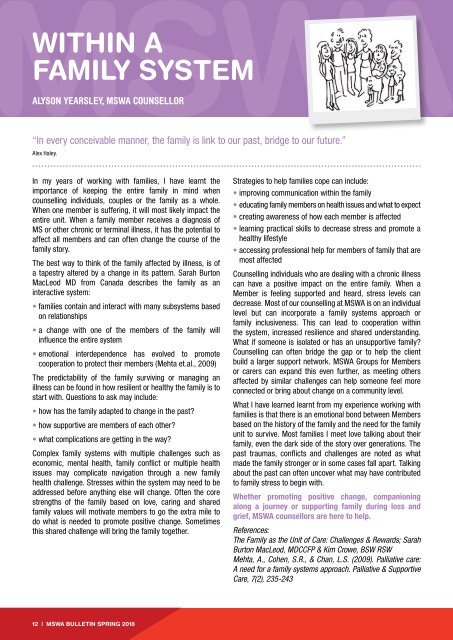You also want an ePaper? Increase the reach of your titles
YUMPU automatically turns print PDFs into web optimized ePapers that Google loves.
WITHIN A<br />
FAMILY SYSTEM<br />
ALYSON YEARSLEY, MSWA COUNSELLOR<br />
“In every conceivable manner, the family is link to our past, bridge to our future.”<br />
Alex Haley.<br />
In my years of working with families, I have learnt the<br />
importance of keeping the entire family in mind when<br />
counselling individuals, couples or the family as a whole.<br />
When one member is suffering, it will most likely impact the<br />
entire unit. When a family member receives a diagnosis of<br />
MS or other chronic or terminal illness, it has the potential to<br />
affect all members and can often change the course of the<br />
family story.<br />
The best way to think of the family affected by illness, is of<br />
a tapestry altered by a change in its pattern. Sarah Burton<br />
MacLeod MD from Canada describes the family as an<br />
interactive system:<br />
• families contain and interact with many subsystems based<br />
on relationships<br />
• a change with one of the members of the family will<br />
influence the entire system<br />
• emotional interdependence has evolved to promote<br />
cooperation to protect their members (Mehta et.al., 2009)<br />
The predictability of the family surviving or managing an<br />
illness can be found in how resilient or healthy the family is to<br />
start with. Questions to ask may include:<br />
• how has the family adapted to change in the past?<br />
• how supportive are members of each other?<br />
• what complications are getting in the way?<br />
Complex family systems with multiple challenges such as<br />
economic, mental health, family conflict or multiple health<br />
issues may complicate navigation through a new family<br />
health challenge. Stresses within the system may need to be<br />
addressed before anything else will change. Often the core<br />
strengths of the family based on love, caring and shared<br />
family values will motivate members to go the extra mile to<br />
do what is needed to promote positive change. Sometimes<br />
this shared challenge will bring the family together.<br />
Strategies to help families cope can include:<br />
• improving communication within the family<br />
• educating family members on health issues and what to expect<br />
• creating awareness of how each member is affected<br />
• learning practical skills to decrease stress and promote a<br />
healthy lifestyle<br />
• accessing professional help for members of family that are<br />
most affected<br />
Counselling individuals who are dealing with a chronic illness<br />
can have a positive impact on the entire family. When a<br />
Member is feeling supported and heard, stress levels can<br />
decrease. Most of our counselling at MSWA is on an individual<br />
level but can incorporate a family systems approach or<br />
family inclusiveness. This can lead to cooperation within<br />
the system, increased resilience and shared understanding.<br />
What if someone is isolated or has an unsupportive family?<br />
Counselling can often bridge the gap or to help the client<br />
build a larger support network. MSWA Groups for Members<br />
or carers can expand this even further, as meeting others<br />
affected by similar challenges can help someone feel more<br />
connected or bring about change on a community level.<br />
What I have learned learnt from my experience working with<br />
families is that there is an emotional bond between Members<br />
based on the history of the family and the need for the family<br />
unit to survive. Most families I meet love talking about their<br />
family, even the dark side of the story over generations. The<br />
past traumas, conflicts and challenges are noted as what<br />
made the family stronger or in some cases fall apart. Talking<br />
about the past can often uncover what may have contributed<br />
to family stress to begin with.<br />
Whether promoting positive change, companioning<br />
along a journey or supporting family during loss and<br />
grief, MSWA counsellors are here to help.<br />
References:<br />
The Family as the Unit of Care: Challenges & Rewards; Sarah<br />
Burton MacLeod, MDCCFP & Kim Crowe, BSW RSW<br />
Mehta, A., Cohen, S.R., & Chan, L.S. (2009). Palliative care:<br />
A need for a family systems approach. Palliative & Supportive<br />
Care, 7(2), 235-243<br />
12 | MSWA BULLETIN SPRING <strong>2018</strong>


















